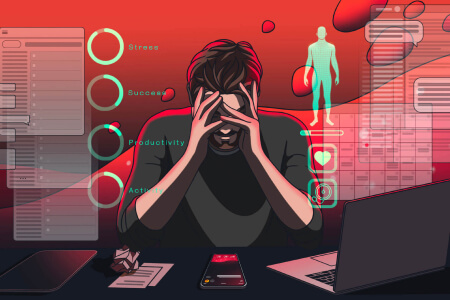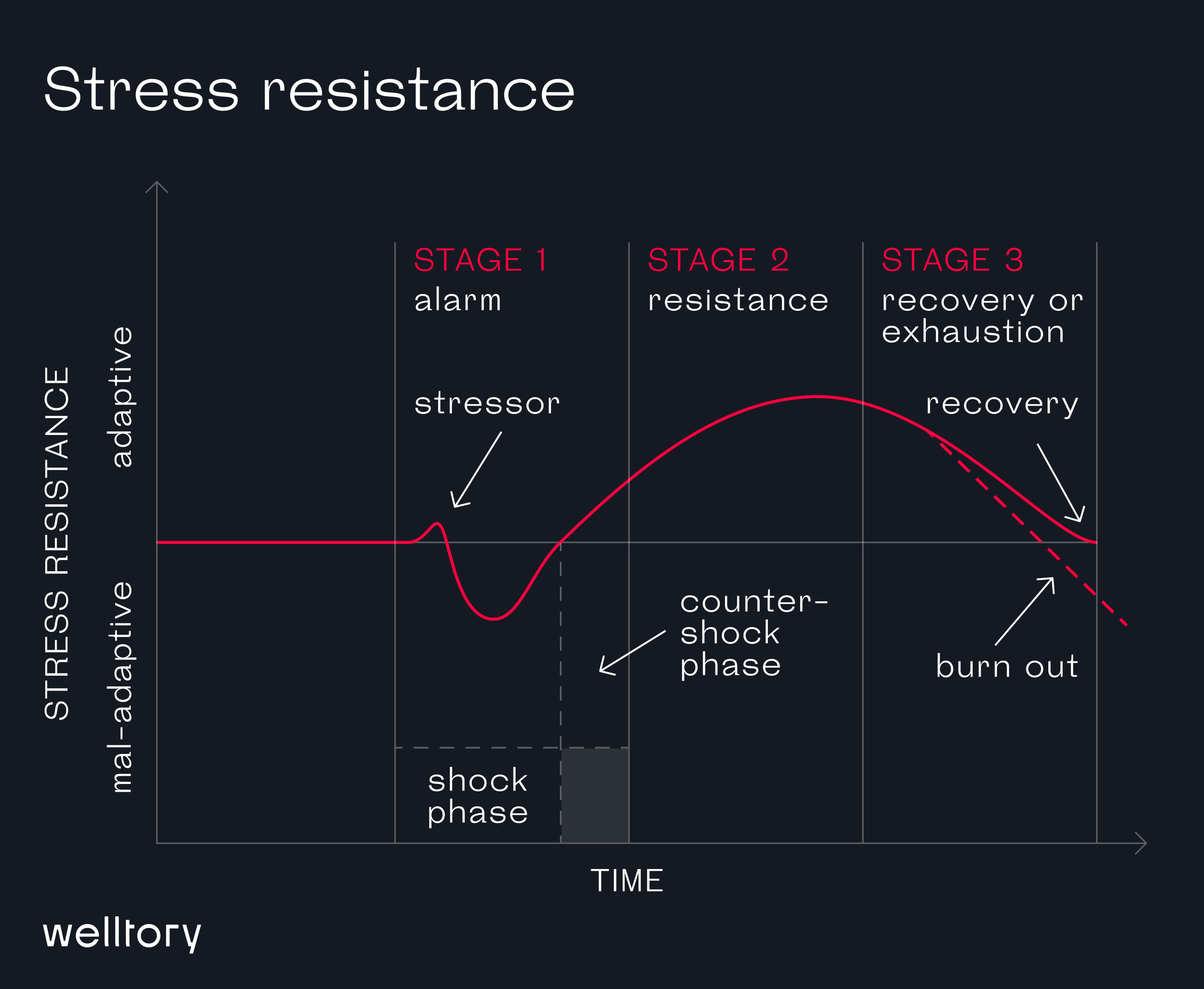
Stress & Energy. Tracking and reducing stress with Welltory HRV
We calculate your level of physical stress and energy based on the evaluation of heart rate variability.
Home » Stress & Energy » What is burnout and how to avoid it

Burnout is a state of mental, physical, and emotional exhaustion caused by long-term, unresolved job-related stress. You may be experiencing burnout if it’s hard for you to wake up in the morning, you can’t concentrate at work, and you feel that you can’t get things done.
Burnout occurs when a job or a project regularly requires more energy than you have. The stress concept of Hans Selye divides the stress reaction into stages of anxiety, resistance, and exhaustion. Burnout occurs in this last stage when your body has struggled with stress for a long time and finally loses the fight.

The American psychiatrist and psychologist Herbert Freudenberger used the term “burnout” for the first time in 1974. He used it to describe the consequences of severe stress and high ideals in “helping” professions. After 50 years of research, it turned out that anyone regularly experiencing high stress can burn out.
Common symptoms of burnout are low performance, exhaustion, and severe fatigue, which don’t go away after sleep or rest. Specific symptoms depend on your profession, personal characteristics, and other factors. For example, doctors and nurses are more likely to suffer from depersonalization — a cynical and insensitive attitude towards patients, which is a protective reaction. Office workers often downplay the importance of their achievements, which can take a toll on their mental health.
Although burnout isn’t classified as a disease, it is officially recognized as a factor that interferes with well-being and can impact your physical and mental health. Burnout is likely to be associated with heart disease, insomnia, mental disorders, and high alcohol consumption. Plus, researchers Armita Golkar et al. found that burnout affects the ability to down-regulate negative emotions and cope with stress. You can check out the full 2014 paper in the Plos One journal.
Workplace burnout is common across the globe. According to Deloitte’s 2015 survey of 1,000 full-time corporate professionals in the US, 77% of employees had experienced burnout in their current job. In Germany, out of 1311 surgeons, around 50% meet the criteria for burnout. This finding was made by Jens Klein and his team in 2010 and published in the International Journal for Quality in Health Care.

Anyone experiencing chronic workplace or personal stress, a mismatch between expectations and opportunities, or uses up their internal resources faster than they can be replenished.
Christina Maslach, who has authored more than 50 research papers about burnout, and her colleagues identified 6 risk factors of burnout: excessive workload, an inability to control their workflow or ask for needed resources, lack of appropriate rewards, losing a sense of positive connection with co-workers, perceived lack of fairness, and conflict between values. Check out the 2001 paper in the Annual Review of Psychology journal for more details.
You are at risk if:
Additional risk factors of burnout include shift work, lack of sunlight, monotonous work, noise, and overcrowding.
Work is not the only cause of burnout. Life circumstances may also be risk factors. You are at risk if:
There are also character traits that can accelerate burnout:
Pay attention to burnout symptoms and take the questionnaire “Are you at risk of burnout?” in the Welltory app.
According to the World Health Organization, burnout is a three-dimensional syndrome characterized by exhaustion, cynicism, and inefficacy. Here’s how you can define each of them.
When exhausted, you experience:
Cynicism is expressed by:
Efficacy is:
It is interesting that women often feel emotionally exhausted and men are more likely to feel cynicism.
A lot of burnout symptoms are similar to depression. However, according to Canadian scientists, patients with depression have relatively high cortisol levels while those who are burnt out have low cortisol levels. When you’re burned out, your body is so exhausted it can no longer produce a stress response.
Also, in the initial stages of burnout, you may have bad thoughts related to the area that brings discomfort. Signs of depression are often negative thoughts about life in general, suicidal thoughts, and a desire to hurt yourself.
The most popular burnout questionnaires are Maslach Burnout Inventory, Copenhagen Burnout Inventory, Oldenburg Burnout Inventory. Find questionnaires in the “Act” tab in our app.
During its early stages, the process of burnout is easier to stop. If your survey results show a mild degree of burnout, reducing your workload will help.
If you’re experiencing more acute burnout, you’re likely experiencing fatigue and irritation and making mistakes. This shows up in your HRV measurements in Welltory in the form of lower energy and higher stress levels. In this case, do things that reduce stress:
The most critical stage of burnout is when you can’t work at all. Essentially, you are in crisis and exhaustion mode. In this state, you cannot force yourself to do anything and feel a great sense of guilt.
Symptoms of the exhaustion stage:
At this point, you need a real break. Go on vacation or take days off to:
Take regular HRV measurements in Welltory. The Stress, Energy, and Health scores will give you insights into how well your body is recovering from burnout.
Burnout can seriously impact your quality of life, but you don’t have to face it alone. If you would like additional help and resources, you can reach out to a psychologist specializing in cognitive-behavioral therapy.

Yes, you can. The most important thing is eliminating chronic stress in time. Remember that your energy is a limited resource.
If you get tired physically, take the following measures:
To prevent mental fatigue:
Restore your emotional energy:
Burnout can be a psychological defense and reaction to your job and other external factors that don’t work for you. When you’re starting to feel stressed, ask yourself: is what I’m doing meaningful, valuable, and useful for me?
Welltory Team, upd. on 16 Sept. 2022

We calculate your level of physical stress and energy based on the evaluation of heart rate variability.

77% of our users experience fatigue, and the main reason is lack balance between stress and recovery. Learn to manage your energy and avoid fatigue.

85% of us experience stress on a daily basis. Find out is stress always bad, what causes it and how to avoid chronic stress.
 App Store
App Store
 Google Play
Google Play
 Huawei AppGallery
Huawei AppGallery
 Galaxy Store
Galaxy Store







